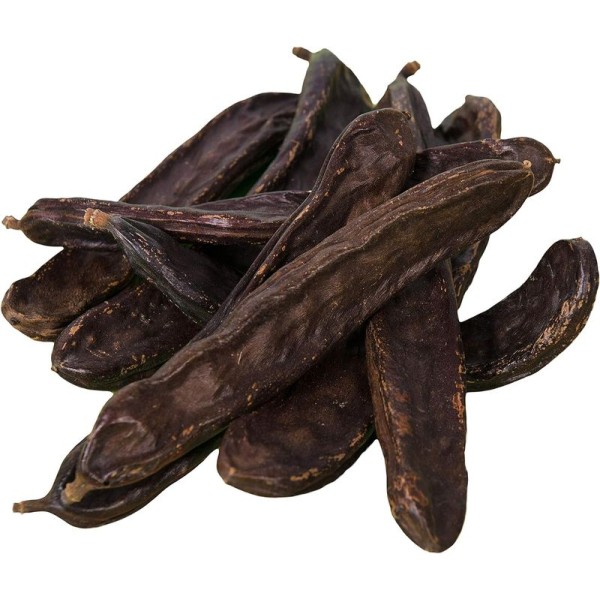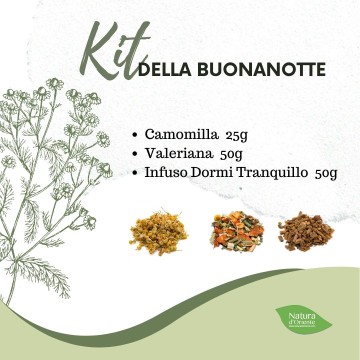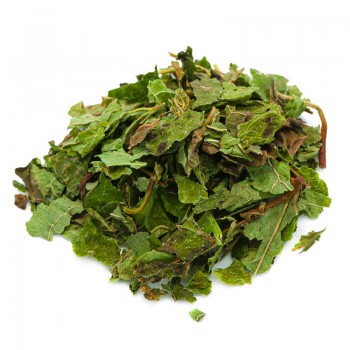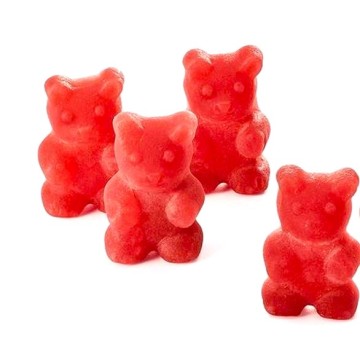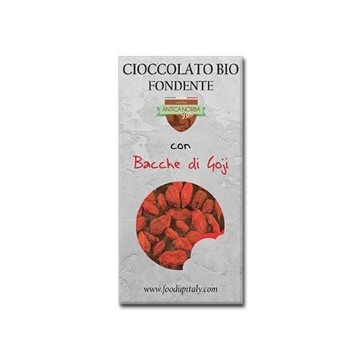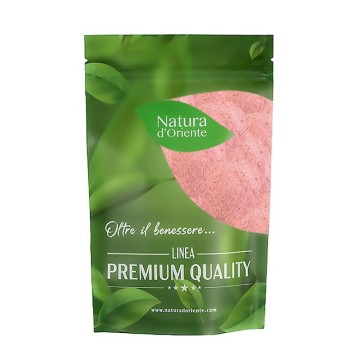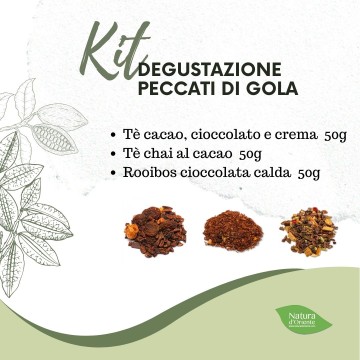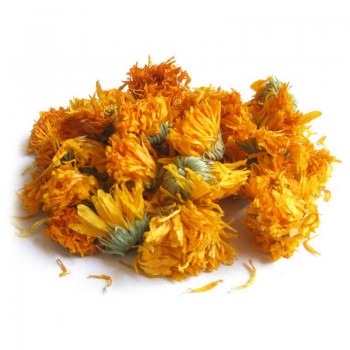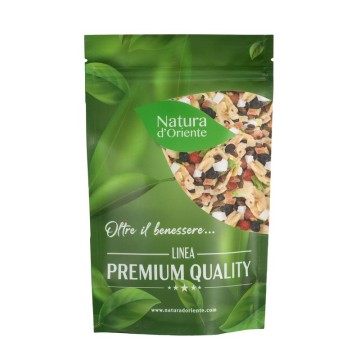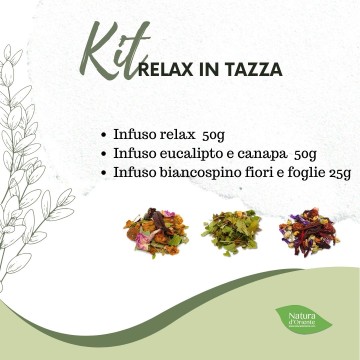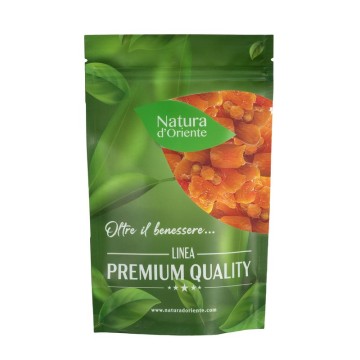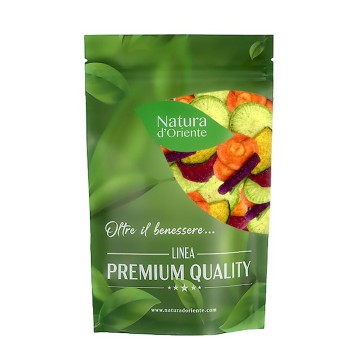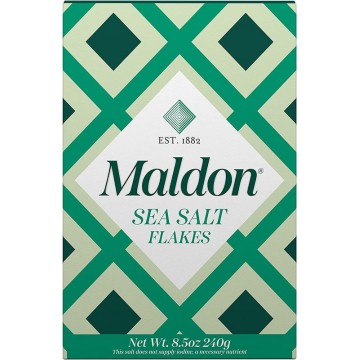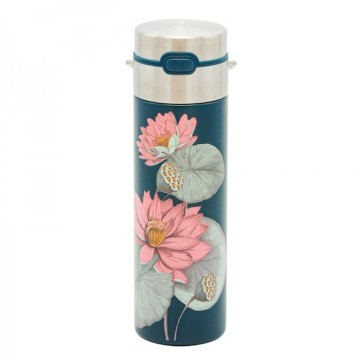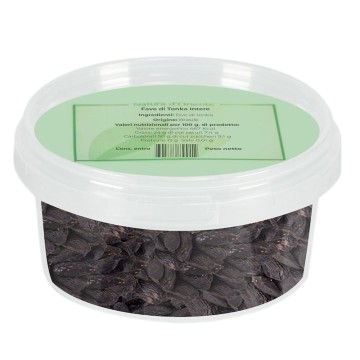Dehydrated carob beans
Reference: 0140
 No reward points for this product.
No reward points for this product.
Carob brings beneficial effects to our organism, linked above all to its content of vitamins and mineral salts. In particular, carobs are a good source of vitamin E and vitamin K, as well as containing calcium, zinc, potassium and phosphorus. Furthermore, for the diet, they are precious foods: carobs are rich in fiber!
Ingredients
carob ![]()
![]()
![]()
Dried dehydrated carobs
Born from the carob plant, they represent the sweet fruits with many properties for the well-being of our organism. Precious nutritional elements also come from the carob pulp, also in the dehydrated version, let's discover them...
Dried carobs: properties, benefits
Carob is an important source of active ingredients, with excellent antioxidant properties, such as vitamins and mineral salts - present in abundance in this fruit.
The benefits derive from the fleshy part between the seeds of the pods (it is a leguminous plant), the pulp which contains fibre, mineral salts, tannins. The external part of the seed casing, however, is rich in complex sugars.
In particular, this fruit is rich in calcium, one of the most used natural sources to strengthen our bone system, and prevent osteoporosis. In fact, carobs contain approximately 3 times more calcium than milk.
The pulp contains, in addition to calcium, minerals such as zinc, potassium, iron, magnesium, phosphorus and silicon, therefore it represents a fruit rich in beneficial substances, well beyond sugars.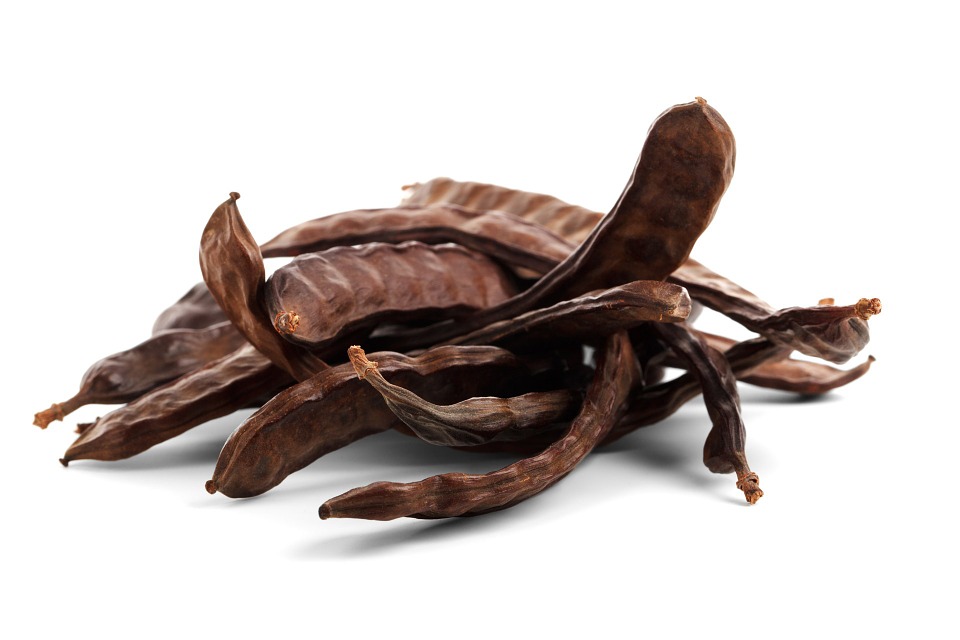 Furthermore, dehydrated carobs provide ahigh fiber content, which is useful for better regulating triglyceride and cholesterol levels in the blood. Furthermore, the supply of fiber facilitates intestinal transit and protects the digestive system. It helps in the secretion of gastric fluids, and has often been used in the past against diarrhea, thanks to the presence of tannins with astringent properties.
Furthermore, dehydrated carobs provide ahigh fiber content, which is useful for better regulating triglyceride and cholesterol levels in the blood. Furthermore, the supply of fiber facilitates intestinal transit and protects the digestive system. It helps in the secretion of gastric fluids, and has often been used in the past against diarrhea, thanks to the presence of tannins with astringent properties.
Moreover, in diets, dried carobs are known to give afeeling of satiety, thanks to their fiber intake; furthermore, being low in sugarsand not excessively caloric, carob can become an excellent snack for those who follow a controlled diet.
Contains many polyphenols, substances considered antioxidants capable of fighting cellular aging.
Other nutritional properties of dried carobs are given by the high content of vitamin E and vitamin K. It can, therefore, be considered a useful food for preventing vitamin and mineral deficiencies that can arise in slimming diets.
Carob in the past was considered an aphrodisiac fruit, which improves sexual performance while maintaining high energy levels.
Being gluten-free, dried carobs can be consumed by those suffering from celiac disease or intolerance to this element.
Origins and history of cultivation
The carob plant (Ceratonia siliqua) is native to the eastern Mediterranean, present up to the edge of the Sahara desert. In fact, it is said that it was the sweet carobs, with a flavor similar to chocolate, that fed the prophet John the Baptist in the desert. For this reason, they are also called the bread of San Giovanni.
The carob spread over time throughout the rest of the Mediterranean, and its fruits were successful both as foods and for therapeutic purposes.
In the refined cuisine of the Renaissance they were used to be transformed into savory or sweet sauces. The ground pulp of the pods, in fact, gives a flour very rich in fiber and mineral salts, which can be considered a substitute for cocoa - sweeter in taste.
When the pods are ripe they are also fed to horses, for which they have been a source of nourishment for centuries. It is important, in fresh versions of carobs, to pay attention to the internal seeds. It is from these very hard seeds that the measurement of gold derives, what we call carats, and which derives from the Arabic qirat, or carob seed. p>
It has been cultivated for centuries, therefore between North Africa and the Mediterranean, also in southern Italy.
The carob that arrives on our tables is usually a pack of dried dehydrated carobs, if not in powder, given that it is difficult to find it as fresh as fruit and the fruit itself hardens with maturation.
Moreover, carob molasses has been used in the streets for centuriesrespiratory problems and to treat cough and sore throat problems.
Plant and Fruit
The plant called carob (Ceratonia siliqua L.) is a fruit tree which according to some scholars belongs to the Caesalpiniaceae family , according to other authors to the Fabaceae.
It is an evergreen plant that is distinguished by gender, between plants with only male flowers and plants with only female flowers. It can reach a height of approximately 10 metres.
The carob tree is a plant that grows well in arid soil, even with a lot of limestone, it tolerates heat but cannot resist frost.
Flowers, fruit and leaves can appear on the same carob tree at the same time, given that the fruit ripens for a very long time. In general, the tree grows slowly and can become several hundred years old.
Flowering, however, usually occurs in August, and maturation is completed a year later, between the following August and October.
they harden and turn brown as they dry and ripen. The pulp also hardens with drying.
The fruit contains 5-15 hard brown seeds, is harvested in autumn, and used in many food products and used in pharmaceutical production.
Nutritional values of dehydrated carobs
Carob is a fairly caloric fruit, with around 217 calories per 100 grams, but it is very rich in proteins, fibers and complex sugars. It is low in fat (0.7%)
It represents a source of antioxidants, in particular flavonoids and micronutrients such as vitamin E (0.6 mg) and vitamin K.
Furthermore, dehydrated carobs maintain the richness of fibers (about 2%), fibers (about 23 g), of which many are insoluble fibres.
The fruit gives a good availability of minerals such as calcium (about 340 mg/100 g) as well as potassium (about 820 mg per 100 g), magnesium (about 50 mg per 100 g ), phosphorus (approximately 80 mg / 100 g) and zinc (approximately 0.9 mg per 100 g).
Dried carobs also contain substances such as tannins, and antioxidants, studied for their properties to combat cellular aging.
How to consume dehydrated carobs in cooking or as a snack
The flavor of carob resembles that of cocoa, which is why it can be used as a substitute, also because it contains fewer calories and is more nutritious than cocoa.
Carobs are also caffeine-free, so they are good for preparing desserts and dishes intended for children, or for people allergic to cocoa.
In particular, the dried carob version can be important as a dietary snack element, compared to chocolate, being rich in fundamental micronutrients but with a moderate caloric intake. In the kitchen, sliced dehydrated carobs can be used to flavor yogurt, fruit salads, smoothies, cereal mixes.
Like many dehydrated fruits, carob can be used for sweet preparations and garnishes, such as for cakes, cupcakes, tops for ice cream in summer.
The dehydrated carob versions can also be used to create energy bars, with a taste similar to cocoa.
Dehydrated locust beans: side effects and contraindications
There are no particular contraindications to the intake of carobs, but like many dried fruits, a moderate intake is always recommended for those suffering from diabetes - despite being a fruit not very rich in sugars compared to others.
The richness of fibre, moreover, in abundant dosescould cause a laxative action, also due to the high content of tannins which can have an irritating effect.
Data sheet
- Carboidrati di cui zuccheri
- Carboidrati
- Grassi
- Proteine
- Saturi
- Valore energetico (calorie)
- Provenienza
- Italia

